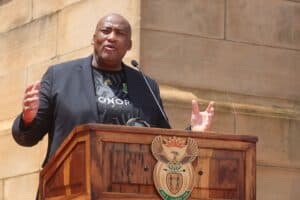The SAHRC is investigating Gayton McKenzie, with the Patriotic Alliance leader making public his defence of his old social media posts.

Patriotic Alliance leader Gayton McKenzie has compiled a comprehensive explanation to present to the South African Human Rights Commission (SAHRC).
McKenzie faced a backlash recently when his old social media posts were dug up in response to him berating podcasters for their comments about the coloured community.
The Minister of Sport, Arts, Recreation and Culture’s repeated use of the k-word in the posts promoted an SAHRC complaint and calls for his axing as minister.
Gayton McKenzie racism claims
The commission stated last Friday that the evidence presented to them was enough to send the minister a letter declaring the allegations against him.
McKenzie initially responded by saying he intended to meet with the SAHRC, but took a more competitive tone on Thursday.
“They effectively released preliminary findings, even suggesting what the penalties could or should be,” stated McKenzie.
“The SAHRC in this way made itself the prosecutor, the judge, the jury, the sentencer and the executioner – all in a single day’s work.”
Here is how McKenzie defends his past racial comments:
K-word related to Jacob Zuma
In December 2015, McKenzie posted; “The word Zuma replaced the word K***ir, criticism has reached racist levels”.
The minister explained that his use of the k-word was to draw attention to what he perceived as racist attacks against former president Jacob Zuma.
“By equating excessive, unfounded critique to the use of a hateful slur, and even hate speech, I was rejecting racism directed at black South Africans in positions of power,” explained McKenzie.
Saving whites over blacks
“In the event of a fire there r sum whites I’ll save b4 I save sum blacks!!!! (sic)”, posted McKenzie in August 2011.
“This post rejected blanket anti-white racism and generalisations, promoting a non-racial approach where individuals are judged by character, not race.
“It showed that I do not assign value to any human being based solely on what race they may happen to be,” McKenzie stated.
‘Like navy blue’
In December 2011, he described a family member as “very very dark skinned, like navy blue”, adding that her partner’s skin tone was even darker.
McKenzie explained that the post was in jest and in line with “intra-community” humour common among his family.
“I regret if it was misinterpreted, but it was non-racial and aimed at familial bonding, not harm,” he stated.
Challenging Ghandi
McKenzie addressed this matter in the immediate aftermath of the posts’ resurfacing, stating the post was meant to challenge the “idealised” image of the famed peaceful protestor from India.
“A K***ir sole ambition is to collect a certain number of cattle to buy a wife with, and then pass his life in indolence and nakedness – Gandhi,” posted McKenzie.
“The intent was to educate and stand up against historical racism, not to promote it. A reasonable interpretation would see this as anti-racist commentary, not hate speech,” he explained.
Three other incidents where McKenzie comments on posts regarding Zulu-based education, African women looking like apes and slang terminology were dismissed as misinterpretations.
“It seems the SAHRC was rendered confused by Twitter formatting from that time,” said McKenzie.
McKenzie concluded by saying the evidence at the disposal of the SAHRC did not show he was racist, but that he was a staunch defender of anti-racism, welcoming whatever course of action the commission pursued.
“If indeed we do find ourselves facing each other in a court, I would relish such an opportunity to clear my name beyond any doubt,” McKenzie concluded.
For a full explanation by McKenzie of 8 comments he had made, read the document below.
NOW READ: Gayton McKenzie ‘intends’ to meet with SAHRC over K-word tweets
Support Local Journalism
Add The Citizen as a Preferred Source on Google and follow us on Google News to see more of our trusted reporting in Google News and Top Stories.








